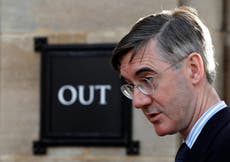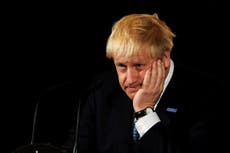The Independent's journalism is supported by our readers. When you purchase through links on our site, we may earn commission.
Is Dominic Cummings really a political genius? Hardly. He may be Boris Johnson’s biggest mistake yet
The only thing this so-called guru of the campaign trail has succeeded in doing is backing the winning side in three votes where the result was already foretold

What actually is Dominic Cummings’ record as a vote-winning guru? So far has he has fought campaigns in which the outcome was foretold.
His first entry into political campaigning was for Business for Sterling, set up 20 years ago to keep the pound. But it was a fake issue: In 1997, Tony Blair had matched John Major’s election promise of a referendum on euro entry. There was never the faintest chance that Blair, in his first or any government, was going to risk a referendum on the euro in which he knew would crash to defeat.
Gordon Brown’s famous “five tests” to see if replacing the pound with the euro was feasible were a complete red herring too. In eight years at the Foreign Office (1997 to 2005), I never met anyone there or in Downing Street who bothered for a second to think Blair would hold a referendum.
Brown bought time in best Whitehall manner. But the endless columns in most of the press, liberal and left as well as anti-EU papers, against the euro had nothing to do with Business for Sterling and had no impact on government either, as Blair would never risk a referendum.
Similarly when Cummings, whose family is based in Northumberland, helped the campaign for a No vote in the 2004 postal vote plebiscite on a regional government for the northeast of England, it was an easy win. The campaign was launched by Peter Mandelson and led by John Prescott; both, by post-Iraq 2004, had lost all the lustre of Labour’s surge to power a decade previously. Blair and most ministers couldn’t have cared less. Labour councillors were furious with the clumsy proposal, which abolished local government as well as their own jobs. Placing the proposed government in Newcastle was an automatic turn-off for all the other cities of the northeast, who reject Newcastle dominance.
On the Brexit referendum, it was clear from the European parliament votes in 2009 and 2014 that, when Europe was on the ballot paper, voters would vote against Europe by voting for anti-EU Ukip and BNP MEPs, and in 2014 giving Nigel Farage‘s then political party the largest number of MEP seats.
The referendum would be fought mainly on immigration: a toxic issue for English voters since Enoch Powell’s surge of nationalist anti-immigrant populism at the end of the 1960s, culminating in his support for a Labour vote in 1974 which helped remove Ted Heath.
In 2014, I wrote a book, Brexit: How Britain Will Leave Europe, which set out all the reasons why if David Cameron did risk a Brexit plebiscite it would result in a No to Europe majority. Every referendum in every EU member state this century which had Europe on the ballot paper produced a No vote, except one in Spain. I could not get any of my friends in the House of Commons, in the think tank or pollster world, in journalism, or in diplomatic circles, to believe my thesis – but I bet a modest sum on Brexit in June 2016 and I cleaned up.
Cummings was associated with all three campaigns – against euro entry, against northeast devolution, and in favour of Brexit. In each, he jumped on a winning bandwagon.
The sight of David Cameron, George Osborne and Theresa May campaigning for the EU in 2016 having spent the previous 15 years denigrating and mocking Europe was laughable. The same was true for Jeremy Corbyn, a devout anti-European since first he entered politics nearly 50 years ago. With people like these leading the pro-Remain campaign, and the Leave side pumping out hate against immigrants, there was no special need for Dominic Cummings. The right-wing newspapers and BBC’s Question Time, with its near-weekly star guest, Nigel Farage, had already won the campaign well before June 2016.
What Cummings has never done is run a political campaign to win a general election. He is not Sir Lynton Crosby.
While an election may soon be called over a no-deal Brexit, most of the campaign will be on a weakening economy with four million people living in poverty, Vauxhall, Honda and Jaguar Land Rover moving jobs out of Brexit Britain, the pound becoming increasingly worthless, NHS patients not getting advanced cancer treatment, old people being denied social care because of council funding cuts, the deep dislike in Scotland of an Old Etonian southern cabinet, and other assorted issues that voters want their government to address.
Most of the country is bored by, dislikes or is indifferent to Brexit. Single-issue elections don’t work in the UK, as Ted Heath and Theresa May both found out.
In his other campaigns, Dominic Cummings was pushing at an open door. In hoping to persuade the British people to vote massively for the most right-wing, elitist government seen in Britain for a century and one – at least in its rhetoric so far – willing to take gargantuan risks with the economy, Cummings may find his work cut out.
Denis MacShane is a former labour minister. His new book, ‘Brexeternity: The Uncertain Future of Britain‘, will be published in September by IB Tauris-Bloomsbury




Join our commenting forum
Join thought-provoking conversations, follow other Independent readers and see their replies